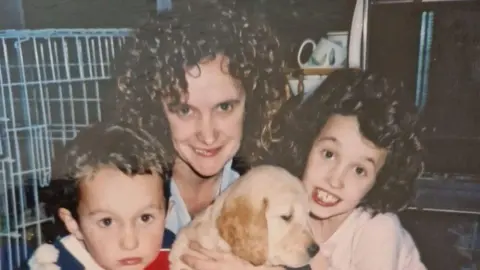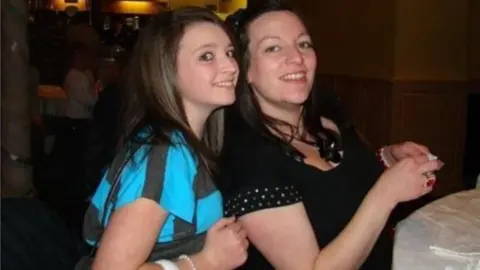Bullying, anorexia, trauma - how the Post Office scandal hurt children
 Millie Castleton
Millie CastletonMillie Castleton was only eight years old when her father lost his job managing the post office in Bridlington, Yorkshire, and her family was branded as "thieves and liars" in the local community.
Nearly a decade later, after facing bullying at school, developing an eating disorder and dropping out of university, she is still struggling with the impact.
Millie's story was singled out by a report published this week, looking into the scandal around subpostmasters who were wrongly accused of fiddling the books.
But hundreds of other children suffered similar experiences, shunned by friends, suffering financial hardship, and watching their parents fall apart under the strain of being accused.
"Part of me will always feel a little broken-up," Millie told the official inquiry into the Post Office scandal, which produced this week's report.
"That nagging voice in my head still says ugly things sometimes. It still tells me that my past and my family's struggle will define me, that it will be a branding on my skin forever. Broken, thief or liar."
Like many subpostmasters, Millie's father, Lee Castleton, challenged the Post Office's allegations that he had taken funds from the branch he managed.
But it took years to win official recognition that people had been wrongly accused and that faulty software on the Post Office system could make it look as though money was missing when it wasn't.
In the meantime, Millie told the inquiry "confusion, frustration and anxiety... was leeching into my home".
At 17 Millie's mental health began to suffer. She experienced "self-loathing, depression and feeling like a burden to [her] family".
Millie managed to take up a place at university but dropped out at the start of her second year after developing anorexia.
Even now, at 29, she finds it hard to trust anyone, she says.
"I sabotage myself by not asking for help with anything. Asking for equipment, advice or resources feels terrifying. Like I'm unworthy."
 Millie Castleton
Millie CastletonThe report provides glimpses into the impact on other families.
Janine Powell's daughter, aged 10, went to live with a friend when Janine, postmistress at a branch near Tiverton in Devon, was convicted and spent five months in prison. The separation from her mother, change of school and deep-seated unhappiness in her new home formed a traumatic experience for the child, the inquiry's report states, leading to mental illness.
Robert Thomson, a subpostmaster in a rural community near Alloa in Scotland, said his children, aged 10 and 13 at the time, were teased and bullied at school, while his wife became reclusive and depressed because she was "so embarrassed and ashamed".
Mahesh Kumar Kalia said his family was "dysfunctional" and his parents separated after their relationship became "toxic and turbulent" following his father's conviction. Mahesh and his father were estranged for 17 years until he understood his father had been wrongly convicted.
"Between the ages of 17 and 35, I did not have a relationship with my dad. We will never get back this time," he told the inquiry.
The government has confirmed that it is setting up a scheme, along the lines recommended in the report, to compensate "close family members" if they "suffered serious adverse consequences" from the scandal. So far there are no details of how the scheme will work or how soon they will see any results.
"We don't want to wait like our parents for three or four year for claims to be settled," said Rebekah Foot.
She established the charity Lost Chances a year and a half ago for the children of wronged subpostmasters and said there was a sense of relief that their situation was now being acknowledged.
Many of the 250 people who have joined Lost Chances had their education disrupted, had to take care of parents or siblings, some watching parents become alcoholics, or have other breakdowns, she said.
Compensation could help some of them return to education or pay for therapy they might otherwise not be able to afford, she said.
"Loss of childhood - we're not sure how that gets put into a claim," she added. That is what happened in her case, she said.
She spent her teenage years looking after her five siblings and working in a chip shop at the weekends while her mother became a recluse.
Rebekah said Lost Chances would be involved in the process of drawing up the new compensation scheme, meeting with ministers in the Department for Business in the coming weeks.
 Rebekah Foot
Rebekah Foot Rebekah Foot
Rebekah FootThe report acknowledges that it may prove difficult to agree which family members should be entitled to compensation, what evidence should be required for a claim to be made, and what the scale of the compensation should be.
However, Professor Richard Moorhead, an expert in law and ethics at the University of Exeter, said the stories about children highlighted by the report had been "heartbreaking" and welcomed the recommendation for compensation.
"Compensation will not right the wrongs or reclaim the time. Their lives have been blighted, but I hope and expect it to make a substantial difference to improving the chances of those children," he said.
